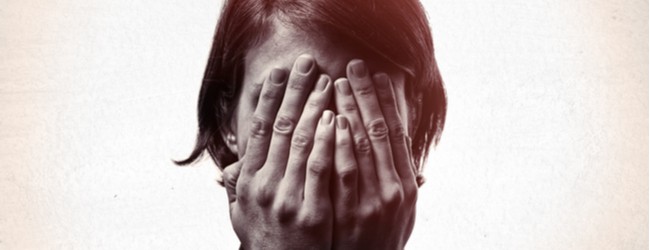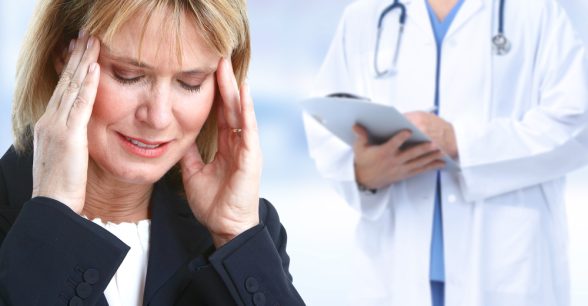Stop Blaming My Sexual Assault On My Disability
To some people, I am their example of an outspoken survivor. I have been called courageous, brave, everything in between. I have spoken at the United Nations and was a delegate at the World Health Organization’s 8th milestones meeting on violence prevention where I brought up the importance of including survivors, and people with disabilities, who were frequently absent from presentations. On the outside I’m intimidating, fearless, willing to speak about my trauma to both educate and make others feel less alone, yet on the inside I have spent the past several years moving from breakdown to breakdown. I pulled away from nearly all my advocacy work in order to focus on my health.
Despite everything I have done, I still struggle to talk about how I was sexually abused as a teenager and young adult by people I thought were my friends. It was a difficult time of my life already, coming from a complex home life as an Autistic kid with difficulty fitting in and understanding others. Coming from a strict family, I struggled with my sexuality but thought my friends were understanding. Instead I had friends that thought it was fun to fool around with the awkward queer friend. It wasn’t.
I was in my twenties by the time I could process this. It did not go well. I became increasingly upset until I found myself at crisis centre, suicidal and non-verbal. That became the first time I spoke aloud about my experiences. I count it as a positive experience because I’m still here today to talk about it. I do remember feeling frustrated, however, when the conversation shifted to my physical health. I left with pamphlets on local support groups for others with chronic illnesses and a lot of eye rolling at how many times my wheelchair was mentioned.
I remember wanting to yell “I don’t have a problem being in a wheelchair, I have a problem being sexually assaulted.”
I didn’t.
I went home on the same bus I took to get there, acted like I was fine, slowly healed a little, but rarely talked about it for years.
I rarely mentioned sexual assault or my experience until our campus developed a sexual misconduct policy. I would occasionally mention something here or there until one day there was a panel on marginalized women and sexual assault.
Leading up to that event, everything that was built up in me, came out in frustration. I started talking about disability and sexual assault, talking about compliance being taught to people with certain disabilities leading to such high assault rates, something I definitely noticed in my own life. I kept talking until I was sitting at the event, listening to the statistics for women with disabilities, statistics I’ve heard before, but for some reason this time the first thought that popped into my head was “I’m gonna get raped.”
Shortly after, I was raped, by a wheelchair user I was sitting next to at that event.
The aftermath was brutal.
After nearly a year of barely surviving I moved to a new city, a new home. Recently, this new home has become the centre of a national discussion on wheelchair users accused of alleged sexual harassment. As someone who has been both raped and sexually abused by wheelchair users, the number of articles assuming someone with a physical disability should not be considered a threat was infuriating, though not surprising. When I disclosed that I was sexually abused by someone in a wheelchair, to a nurse, I was corrected that my experience “was only coercion because I should have been able to fight back.” This was one of many comments I received that judged my experiences based on the physicality of those who assaulted me.
There is a reluctance to discuss sex and disability which becomes more complex when considering multiple disabilities and marginalized disabled people. My comfort with my sexuality, gender, and multiple disabilities makes others uncomfortable. It also creates difficulty in finding spaces to discuss these overlapping issues. Even in groups where sex is discussed openly, the addition of disability can make people extremely uncomfortable. For instance, during the first Women’s March, where both Sex Work and Disability were points of contention, I found myself isolated. I was ignored and felt unsafe expressing myself. No one knew that my thoughts were a result of being exploited due to my attempted involvement in sex work.
This is one of the hardest parts of my experience to discuss. Disabled people are routinely turned into pawns in difficult discussions. I feel frustrated then others who claim to speak for my rights turn me and those like me into points to argue and discuss. It makes me feel re-exploited.
These past few weeks I have been reminded of the importance of these conversations.
Allegations of sexual harassment should always be taken seriously. We cannot judge the seriousness of an allegation based on someone’s apparent abilities. Ableism takes many forms, and assuming that disability can determine the seriousness of harassment or assault is a form of ableism. Disabled people, like non-disabled people, are not automatically innocent or guilty.
As a society we want to desexualize people in wheelchairs, and other disabilities. This extends to excusing inappropriate behaviour from disabled people, blaming their disabilities or wrongly believing their disabilities prevent them from being a threat. As an example, at both anime and comic conventions I’ve attended, there has been an increased discussion about the high rates of sexual assault and harassment. However, I would constantly hear, from friends, volunteers, and while walking around, that the high rates of sexual assault and harassment were a result of the perceived high attendance rates of Autistic people. Not only was this not true, part of my sexual abuse history was from non-autistic disabled people at conventions. As such, as a non-binary Autistic person, I no longer feel safe attending most conventions. With the way we focus our few conversations on disability and sex, we often ignore the high rates of sexual abuse experienced by disabled women, especially those with cognitive disabilities, multiple disabilities, those who are multiply marginalized, and disabled women of colour.
As a disabled community, we need to talk about sex – the good and the bad. We need to talk about consent, true consent, and what to do when it’s not happening. We need appropriate crisis care.
We need to feel safe, to feel that we are allowed to talk about this.
About Rooted In Rights
Rooted in Rights exists to amplify the perspectives of the disability community. Blog posts and storyteller videos that we publish and content we re-share on social media do not necessarily reflect the opinions or values of Rooted in Rights nor indicate an endorsement of a program or service by Rooted in Rights. We respect and aim to reflect the diversity of opinions and experiences of the disability community. Rooted in Rights seeks to highlight discussions, not direct them. Learn more about Rooted In Rights



